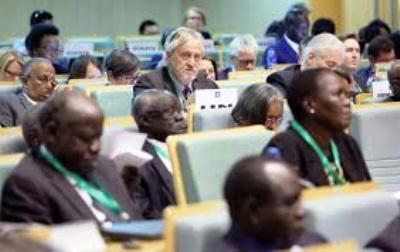EU urged to help revive South Sudan’s peace process
March 29, 2018 (WASHINGTON) – The European Union (EU) should more clearly and consistently assert leadership and develop much-needed financial leverage that could support a truly reinvigorated peace process in South Sudan, a country “hijacked by corrupt elites and marred by brutal conflict and urgent humanitarian crises”, the U.S-based advocacy group (Enough Project) said in a new report.

Brad Brooks-Rubin and Jonathan Benton jointly authored the report.
Last year alone, the EU reportedly provided over 350 million euros in aid to South Sudan, focusing particularly on assistance to South Sudan’s neighbours facing serious challenges related to caring for the over 2 million refugees, who have crossed the border for safety.
In addition, however, the United Kingdom plays a leading role in international diplomacy on South Sudan through its place in the “Troika” (along with Norway and the United States), and a number of EU member states also play critical roles in providing development assistance and support to South Sudan and the broader region.
The reports urges a modernized approach, including financial leverage and associated incentives, the likes of which have never been used by the EU with respect to conflicts in sub-Saharan Africa, to demonstrate to violent kleptocrats in South Sudan who are bent on violence and corruption that leverage exists to stop them.
“The international community is slowly developing an evolving strategy of applying pressures to the spoilers of the South Sudanese peace process and those whose networks are profiting from diversion of oil wealth and other resources,” said Brooks-Rubin, co-author and Managing Director at the Enough Project and The Sentry.
He added, “The tide is shifting, and clear action by the European Union can press this effort forward and provide negotiators with real leverage to start to bring about real change in South Sudan.”
Early this month, the EU said it was ready to impose an arms embargo on South Sudan if its warring parties do not immediately cease hostilities and continue ignoring ongoing peace talks.
The threat of an arms embargo came a day after the United States on circulated a draft United Nations Security Council resolution that threatens to impose an arms embargo on South Sudan and to take “all appropriate measures” against those blocking its peace efforts.
“The European Union and its member states have led many elements of the evolving international architecture devoted to combating corruption and conflict around the world,” said Benton, report co-author and Operations Director at The Sentry in the report.
“There is now a clear opportunity for the EU to build on this leadership and apply new financial pressures to the crisis in South Sudan, where grand corruption is driving so much of the humanitarian crisis that Europe is spending hundreds of millions of euros every year to ease,” he added.
Meanwhile, the report lays out short, medium, and long term tools that the EU can deploy as part of a thoughtful and coordinated strategy to help end the crisis and suffering in war-torn South Sudan.
Among the measures, it says, are designating for sanctions key spoilers of the peace process and their business networks.
“Sanctions placed on only a few individuals and that lack enforcement are ineffective,” the report, adding that “Sanctions measures must impact not only individuals, but also their networks”.
Also, the EU has been urged to engage neighboring government by putting pressure on the key countries in the region, notably the financial intelligence units, central banks, and ministries of foreign affairs in Uganda and Kenya to monitor funds got from South Sudan.
The advocacy group further recommended “Imposing sectoral-based restrictive measures on economic sectors that are under the control of certain political and military elites, such as the extractive industries, banking, and transport sectors”.
Now in its fifth year, the conflict in South Sudan has left tens of thousands of people dead, more 2 million displaced and half of the population at threat of facing severe starvation, aid agencies say. A recent report by the United Nations and South Sudan government said up to 150,000 people could slip into severe famine this year.
(ST)
